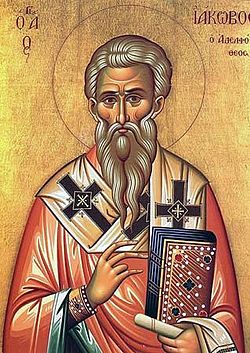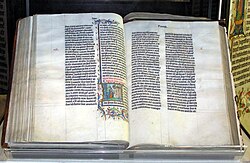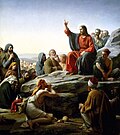Council of Jerusalem

| Part of a series on the |
| Bible |
|---|
 |
| Outline of Bible-related topics |
The Council of Jerusalem or Apostolic Council is a council described in chapter 15 of the Acts of the Apostles, held in Jerusalem c. AD 48–50.
The council decided that Gentiles who converted to Christianity were not obligated to keep most of the rules prescribed to the Jews by the Mosaic Law, such as Jewish dietary laws and other specific rituals, including the rules concerning circumcision of males. The council did, however, retain the prohibitions on eating blood or meat containing blood, and meat of animals that were strangled, and on fornication and idolatry, sometimes referred to as the Apostolic Decree. The purpose and origin of these four prohibitions is debated.
Accounts of the council are found in Acts of the Apostles (chapter 15 in two different forms, the Alexandrian and Western versions) and also possibly in Paul's letter to the Galatians (chapter 2). Some scholars dispute that Galatians 2 is about the Council of Jerusalem, while others have defended this identification.
Historical background
Jerusalem was the first center of the Christian Church according to the Book of Acts and (according to the Catholic Encyclopedia) the location of "the first Christian church". The apostles lived and taught there for some time after Pentecost. James the Just, brother of Jesus was leader of the early Christian community in Jerusalem, and his other kinsmen likely held leadership positions in the surrounding area after the destruction of the city until its rebuilding as Aelia Capitolina in c. AD 130, when all Jews were banished from Jerusalem.
The apostles Barnabas and Paul went to Jerusalem to meet with the "Pillars of the Church": James the Just, Peter, and John. The Council of Jerusalem is generally dated to c. AD 48-50, roughly 15 to 25 years after the crucifixion of Jesus (between AD 26 and 36). Acts 15 and Galatians 2 both suggest that the meeting was called to debate the legitimacy of the evangelizing mission of Barnabas and Paul to the Gentiles and the Gentile converts' freedom from most of the Mosaic Law, especially from the circumcision of males, a practice that was considered execrable and repulsive in the Greco-Roman world during the period of Hellenization of the Eastern Mediterranean, and was especially disdained in Classical civilization both from ancient Greeks and Romans, which instead valued the foreskin positively.
At the time, most followers of Jesus (which historians refer to as Jewish Christians) were Jewish by birth and even converts would have considered the early Christians as a part of Judaism. According to scholars, the Jewish Christians affirmed every aspect of the contemporary Second Temple Judaism with the addition of the belief that Jesus was the Jewish Messiah.
Issues and outcome
The purpose of the meeting, according to Acts, was to resolve a disagreement in Antioch, which had wider implications than just circumcision, since circumcision is considered the "everlasting" sign of the Abrahamic covenant in Judaism (Genesis 17:9–14). The Acts say that "certain men which came down from Judaea" were preaching that "[u]nless you are circumcised according to the custom of Moses, you cannot be saved"; Acts states that furthermore some of the Pharisees who had become believers stated that it was "needful to circumcise [the Gentiles,] and to command [them] to keep the law of Moses" (KJV).
The primary issue which was addressed related to the requirement of circumcision, as the author of Acts relates, but other important matters arose as well, as the Apostolic Decree indicates. The dispute was between those such as the followers of the "Pillars of the Church", led by James, who believed that the church must observe the Torah (i.e. the rules of traditional Judaism (Galatians 2:12)), and Paul the Apostle, who called himself "Apostle to the Gentiles", who believed there was no such necessity. The main concern for Paul, which he subsequently expressed in greater detail with his letters directed to the early Christian communities in Asia Minor, was the inclusion of Gentiles into God's New Covenant, sending the message that faith in Christ is sufficient for salvation.
At the council, following advice offered by Peter (Acts 15:7–11 and Acts 15:14), Barnabas and Paul gave an account of their ministry among the gentiles (Acts 15:12), and James quoted from the words of the prophet Amos (Acts 15:16–17, quoting Amos 9:11–12). James added his own words to the quotation: "Known to God from eternity are all His works" and then submitted a proposal, which was accepted by the Church and became known as the Apostolic Decree:
Acts 15:23–29 sets out the content of the letter written in accordance with James' proposal. The Western version of Acts (see Acts of the Apostles: Manuscripts) adds the negative form of the Golden Rule ("and whatever things ye would not have done to yourselves, do not do to another").
This determined questions wider than that of circumcision, particularly dietary questions, fornication, idolatry, and blood, as well as the application of Biblical law to non-Jews. It was stated by the apostles and elders in the council: "the Holy Spirit and we ourselves have favored adding no further burden to you, except these necessary things, to abstain from things sacrificed to idols, and from blood, and from things strangled, and from fornication. If you carefully keep yourselves from these things, you will prosper." (Acts 15:27–28) This Apostolic Decree was considered binding on all the other local Christian congregations in other regions.
The author of Acts gives an account of a restatement by James and the elders in Jerusalem of the contents of the letter on the occasion of Paul's final Jerusalem visit, immediately prior to Paul's arrest at the temple, recounting: "When we had come to Jerusalem, the brothers received us gladly. On the following day Paul went in with us to James, and all the elders were present." (Acts 21:17–18, ESV) The elders then proceed to notify Paul of what seems to have been a common concern among Jewish believers, that he was teaching diaspora Jewish converts to Christianity "to forsake Moses, telling them not to circumcise their children or walk according to our customs." They remind the assembly that, "as for the Gentiles who have believed, we have sent a letter with our judgment that they should abstain from what has been sacrificed to idols, and from blood, and from what has been strangled, and from sexual immorality". In the view of some scholars, the reminder of James and the elders here is an expression of concern that Paul was not fully teaching the decision of the Jerusalem Council's letter to Gentiles, particularly in regard to non-strangled kosher meat, which contrasts with Paul's advice to Gentiles in Corinth, to "eat whatever is sold in the meat markets" (1 Corinthians 10:25).
Historicity
The description of the Apostolic Council in Acts 15, generally considered the same event described in Galatians 2, is considered by some scholars to be contradictory to the Galatians account. The historicity of Luke's account in Acts has been challenged and was rejected by some scholars in the mid to late 20th century. However, more recent scholarship inclines towards treating the Jerusalem Council and its rulings as a historical event, though this is sometimes expressed with caution. Bruce Metzger's Textual Commentary on the Greek New Testament includes a summary of current research on the topic as of about 1994:
Origin of the Council's decision
| Part of a series on |
| Jewish Christianity |
|---|
 |
The Council of Jerusalem retained the prohibitions on eating blood, meat containing blood, and meat of animals that were strangled, and on fornication and idolatry. The resulting Apostolic Decree in Acts 15 may simply parallel the seven Noahide laws found in the Old Testament, and thus be a commonality rather than a differential. However, modern scholars dispute the connection between Acts 15 and the seven Noahide laws. The Apostolic Decree may have been a major act of differentiation of the early Church from its Jewish roots.
The Jewish Encyclopedia states:
The Jewish Encyclopedia also states:
The 20th-century American Catholic priest and biblical scholar Joseph A. Fitzmyer SJ disputes the claim that the Apostolic Decree is based on the seven Noahide laws (Gen 9), and instead proposes Lev 17–18 as the basis for it. (See also: Leviticus 18).
Obsolescence
While the prohibitions of the Apostolic Decree were reiterated in the Apostolic Canons and at the Council in Trullo, it "has been obsolete for centuries in the West", according to the 19th-century German Catholic bishop Karl Josef von Hefele, though it is still nominally recognized and observed by Eastern Orthodox Christians.
The apostolic decree was defined by the Council of Florence to have been obsolete when the distinction between Jewish and gentile converts had disappeared:
This reasoning was repeated in Pope Urban VIII's Creed for Oriental converts of 1642 and Pope Benedict XIV's encyclical Ex Quo of 1756.
See also
- Ancient church councils (pre-ecumenical)
- Antinomianism
- Biblical law in Christianity
- Binding and loosing
- Christian ethics
- Circumcision controversy in early Christianity
- Circumcision in the Bible#In rabbinic literature
- Circumcision in the Bible
- Incident at Antioch
- Jewish Christians
- Judaizers
- Legalism (theology)
- New Perspective on Paul
- Pauline Christianity
Notes
References
Further reading
- Badenas, Robert. Christ the End of the Law, Romans 10.4 in Pauline Perspective, 1985ISBN 0-905774-93-0
- Brown, Raymond E. An Introduction to the New Testament. Anchor Bible Series, 1997.ISBN 0-385-24767-2.
- Bruce, Frederick Fyvie. Peter, Stephen, James and John: Studies in Early Non-Pauline Christianity
- Bruce, Frederick Fyvie. Men and movements in the primitive church: Studies in early non-Pauline Christianity
- Clark, A.C. The Acts of the Apostles, A critical edition with Introduction and Notes on selected passages, Oxford, Clarendon Press, 1933
- Dunn, James D.G. "The Incident at Antioch (Galatians 2:11–18)," JSNT 18, 1983, pg 95–122
- Dunn, James D.G. Jesus, Paul and the Law,ISBN 0-664-25095-5
- Dunn, James D.G. The Theology of Paul's Letter to the Galatians 1993ISBN 0-521-35953-8
- Dunn, James D.G. The Theology of Paul the Apostle Eerdmans 1997ISBN 0-8028-3844-8
- Ehrman, Bart D. Lost Christianities: The Battle for Scripture and the Faiths We Never Knew 2003
- Eisenman, Robert, 1997. James the Brother of Jesus: The Key to Unlocking the Secrets of Early Christianity and the Dead Sea Scrolls.ISBN 0-670-86932-5 A cultural historian's dissenting view based on contemporary texts.
- Elsner, Jas. Imperial Rome and Christian Triumph: Oxford History of Early Non-Pauline Christianity 1998ISBN 0-19-284201-3
- Gaus, Andy. The Unvarnished New Testament 1991ISBN 0-933999-99-2
- Keener, Craig S. Acts: An Exegetical Commentary: Volume 3, 15:1–23:35. Grand Rapids: Baker, 2014.
- Kim, Seyoon Paul and the New Perspective: Second Thoughts on the Origin of Paul's Gospel 2001ISBN 0-8028-4974-1
- Knecht, Friedrich Justus (1910). . A Practical Commentary on Holy Scripture. B. Herder.
- Maccoby, Hyam. The Mythmaker: Paul and the Invention of Christianity. New York: Harper & Row, 1986.ISBN 0-06-015582-5.
- MacDonald, Dennis Ronald, 1983. The Legend and the Apostle: The Battle for Paul in Story and Canon Philadelphia: Westminster Press.
- Metzger, Bruce M. A Textual Commentary on the Greek New Testament 1975ISBN 3-438-06010-8
- Mount, Christopher N. Pauline Christianity: Luke-Acts and the Legacy of Paul 2001
- Ropes, J.H., The Text of Acts, Vol. III; The Beginnings of Christianity: Part I: The Acts of the Apostles, London: MacMillan & Co., Ltd., 1926
- Sanders, E.P. Paul and Palestinian Judaism: A Comparison of Patterns of Religion 1977ISBN 0-8006-1899-8
- Sanders, E.P. Paul the Law and the Jewish People 1983
- Sanders, E.P. Jesus and Judaism, Fortress Press, 1987,ISBN 0-8006-2061-5
- Savelle, Charles. “A Reexamination of the Prohibitions in Acts 15.” Bibliotheca Ssacra 161 (2004): 449–68.
- Simon, Marcel. The Apostolic Decree and its Setting in the Ancient Church. Bulletin of the John Rylands Library, LII (1969–70), pp. 437–460
- Telfer, W. The Didache and the Apostolic Synod of Antioch The Journal of Theological Studies, 1939, pp. 133–146, 258–271
- Westerholm, Stephen. Perspectives Old and New on Paul: The "Lutheran" Paul and His Critics 2003ISBN 0-8028-4809-5
- Wright, N.T. What Saint Paul Really Said: Was Paul of Tarsus the Real Founder of Christianity? 1997ISBN 0-8028-4445-6